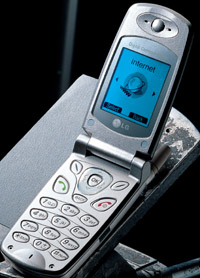The study shows that Armenia has thought about giving a long-term (until 2013) monopoly to “ArmenTel” in the telecommunications field beforehand, during the beginning stages of the reconstruction period. According to the WB, Armenia has not completely granted monopoly, the monopoly has been transparent and no regulations have been set. In November 2004, after many debates and negotiations, the government granted a new license to “ArmenTel”, signed a new regulation contract and came out with the second GSM license. That helped make the market a little more free. The abovementioned contract states that the next GSM license will be given on January 1, 2009. The WB believes that the second GSM license to the telecommunication operator “K-Telecom” did not correspond to international standards because “K-Telecom” was the only candidate.
“The government considers the second telecommunication operator as “crucial for the nation’s security” and has allowed Karabagh to enter the field with all the rights and privileges,” states the WB report.
Cell phone subscribers in Armenia don’t really benefit from the variety of services as a result of the phone coverage due to the fact that “ArmenTel” has 85% coverage in residential areas, including the major regions and cities of Armenia. That’s why it will be pretty hard for the new operator (“K-Telecom”) to attract attention just because it exists in the world. Based on the licensing contract, “K-Telecom” must provide the GSM coverage in Yerevan and the regions within a year. It also has to provide coverage in the 200 villages within two years, as well as 85% on the borders of Georgia and Iran.
“Besides that, Armenia’s telecommunications field allows for it to achieve great heights by reducing prices and increasing effectiveness, but at the same time it can not have that at all. “ArmenTel” has already built most of its network. According to the clauses of the contract with “K-Telecom”, the company doesn’t have the “national roaming” right, which means that they have to make large investments so that they can start having different network branches,” says the WB.
Judging from the deadlines and terms of both licensing contracts, a well as the new regulation contract of “ArmenTel”, the WB concludes that “the current structure of the market will not change anytime soon and will not give an opportunity for other competitors until 2009.”
It is worth mentioning that although the World Bank says that it will be hard to have another competitor, however it’s quite possible because according to the 4th article of the contract, there are some contracts where another company can provide its services too.
“It is hard to predict whether or not “ArmenTel” will provide services such as a fixed line, long-distance calls and mobile services,” state the WB report.
It is clear that the competition between the two cellular phone oligopolies of Armenia crosses all borders. The WB report concludes by emphasizing that both “ArmenTel” and “K-Telecom” are competing against each other to see who subscribes the most citizens, but “ArmenTel” already has 205,000 cell phone subscribers.
The WB prefers to see another competitor from the social perspective because generally, new operators offer services that the dominant one doesn’t. Besides that, the new operators often provide the given service for lower prices and go against other competitors with their effective customer service.
“Unfortunately, not much has been done to go deep into the unbalanced competition. The high prices for telecommunications in Armenia are due to the fact that Armenia is separated from the U.S. and Europe. The low prices are a necessity for economies with not many outlooks. That is why it is important for the government and the Public Services Regulatory Commission to get active and solve the issue the way it should be solved,” says the WB in closing.

